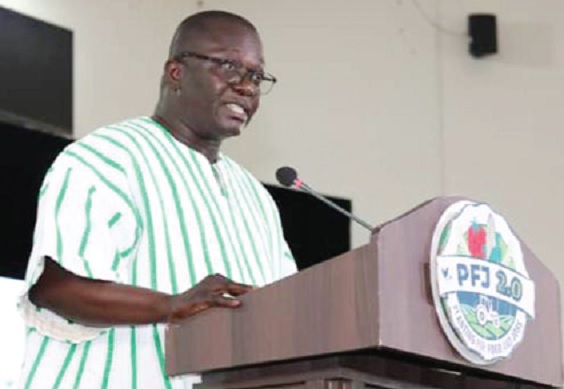Food and Agriculture Minister, Dr Bryan Acheampong, has appealed to traditional authorities to make parcels of land available to interested farmers to ensure the successful Planting for Food and Jobs Phase Two II (PFJ 2.0) programme.
The success of the PFJ 2.0, he said, would hinge largely on access to tracts of arable lands as it was one of the main challenges facing agriculture production.
“The Ministry of Food and Agriculture intends to tackle the problem of access to tracts of agricultural land through the establishment of agricultural zones to drive sustainable and commercially oriented agriculture with emphasis on climate-smart agriculture”.
“The success of PFJ 2.0 will hinge largely on the availability of land, therefore our traditional authorities have an important role to play in the implementation of the PFJ 2.0 programme,” he noted.
Dr Acheampong, who made the appeal at the launch of the PFJ 2 programme in Tamale last Monday, indicated that the initiative formed part of the government’s five-year strategic plan to attain self-sufficiency in grains, vegetables, tubers and poultry production in the country.
The initiative seeks to consolidate the gains of the first phase which started in 2017.
PFJ 2.0, also known as the Input Credit System, will provide affordable and timely credit specially designed to meet the needs of farmers.
The initiative is aimed at transforming and modernising the agricultural value chain through the active participation of the private sector, improving service delivery to maximise impact and creating decent jobs for the teeming youth.
The input credit system replaces the input subsidy programme under the first phase of PFJ.
Innovative approach
Modelled on the successful implementation of the first phase of the PFJ, the government’s agricultural flagship programme initiated in 2017, the new phase is targeting about 1.2 million farmers nationwide for the cultivation of grains, tubers, vegetables and other crops.
The five-year programme is expected to create more than 420,000 direct and indirect jobs along the value chain.
Participants in the launch
The government of Brazil is supporting the programme with $62 million, while the government of Czech Republic has voted €10 million for the intervention over the five-year period.
Dr Acheampong, who gave the overview of the programme, explained that PFJ 2.0 had been designed as a bold, innovative and comprehensive approach to tackle food insecurity head-on.
The underpinning model, which was the Input Credit System, he said, would solve a number of critical challenges, namely access to credit, quality of agro inputs, unstructured markets of agricultural produce and low mechanisation.
“Indeed, when we roll out the programme in full, one will no longer need to mobilise upfront financing for land development and preparation as well as seeds and fertilisers which together constitute about 80 per cent of production cost”.
“I’m bold to predict that with time, the new slogan for agriculture would be: PFJ 2.0, ‘nea wohia ara ne asaase’ – to wit “all you need is access to land and all other things shall be added,” Dr Acheampong said.
High imports
Having committed over GH¢1.2 billion for irrigation infrastructure in northern Ghana alone, the Minister of Food and Agriculture said there was no justification for the current state of high imports of vegetables from the sub-region in spite of the huge potential for all-year round production.
The minister cited a recent meeting with onion importers plying the Niger route, which revealed that an average of $2 million was spent weekly to import onions.
“I deem this to be an embarrassment and needless drain on our scarce foreign exchange.
It was, however, refreshing to me when they disclosed their willingness to convert their import trade to local production and trading,” Dr Acheampong stated.
For his part, the Northern Regional Minister, Shani Alhassan Shani, thanked the government for initiating the programme, saying “it will go a long way to consolidate gains in the sector and create more jobs for the unemployed youth”.
Source: graphic.com.gh

